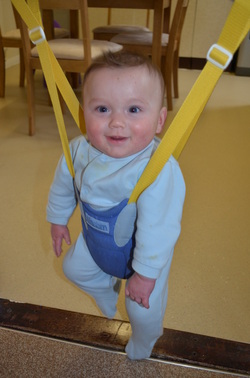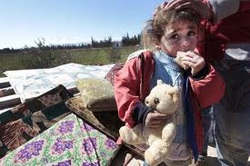
They are approaching their first birthday at the end of May. It's been a long, difficult, at times gruelling and emotionally challenging year for my daughter who has had to cope with her three children by herself much of the time. They were born 10 weeks early so developmentally they are really only nine months old. In the last few weeks Archie has learnt to sit and this has liberated him so that he can do occupy himself so much more. His development is in stark contrast to Alfie's who actively resists sitting... In the last few weeks we have become acutely aware and concerned of differences in his development compared to Archie's. We have always been conscious of the consultant's diagnosis before they left hospital that Alfie's brain scans showed signs of damage - probably because his brain was starved of oxygen at some point. Something that I think is not unusual in babies with such low birth weights. We have lived in hope that everything will be okay but we think we are now seeing the effects of this damage in his development. For the first time this week I googled to find out something about cerebral palsy. The information was both reassuring (that there is help and the condition doesn't get worse) and distressing (depending on the degree it can be quite disabling). There are a number of signs that are pointing to this condition for example one of Alfie's arms seems less active than the other, he throws himself backwards when sitting or standing and he often goes into a trance. I know my daughter and her husband are very worried as I am for them and Alfie. The physiotherapist came today and she is going to arrange for some tests for Alfie to check on epilepsy and his cognitive functioning.. I tried to reassure my daughter that the testing is for the best as the earlier any discoveries are made the quicker treatments can be put in place.. But my heart bleeds for them as parents. But she is a remarkable woman and Alfie is fortunate to have her for his mum.. She will I know do everything she can for him and I/we will try and support her and them as family as much as we can. We will not give up hope that his life will not be so limited and I will not dwell on all the potential scenarios and imaginings of of what lies ahead. Instead I will remember the wonderful smile he gives me when he hears 'Hello Alfie its granddad!' and the way he rests on my tummy when I cuddle him. What a funny mix of joy and sadness life can be.






 RSS Feed
RSS Feed